Marketing expert Dr Mike Lee has kept a ten-year watch on the anti-vaccination movement. In this illuminating talk, he explores the key reasons people reject vaccinations and how we could develop herd immunity against harmful misinformation.
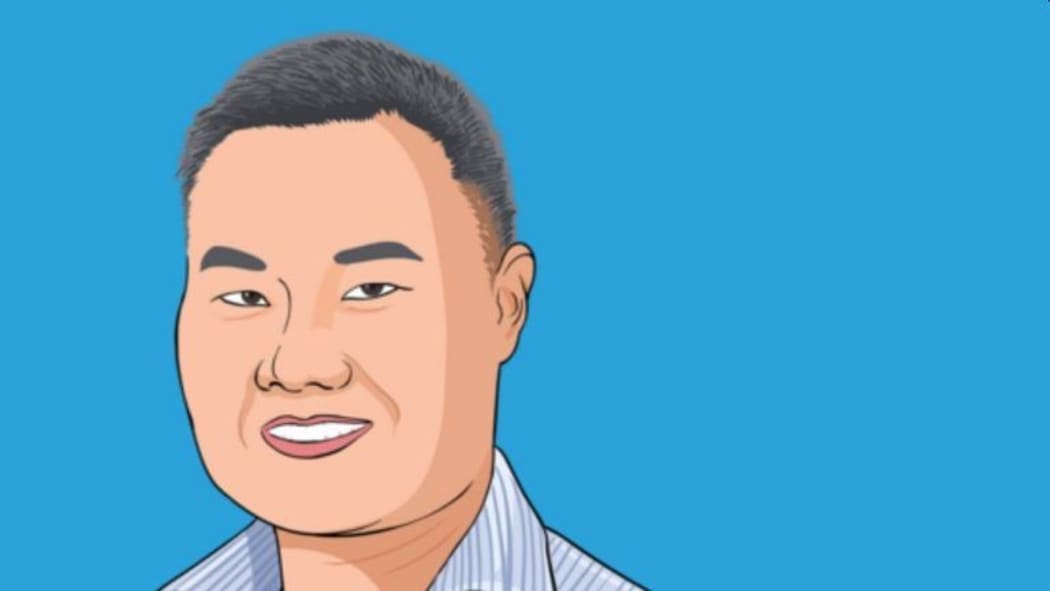
Photo: The University of Auckland
(From Raising the Bar - Home edition 2021)
In 2011, Dr Mike Lee began his research into the anti-vaccination movement that opposed mandatory vaccination for childhood communicable diseases such as measles, mumps and rubella. At that time, so-called "anti-vaxxers" were on the fringes of society.
Fast-forward to 2021, and those hostile to vaccines have a brand new target as governments and pharmaceutical companies roll out Covid-19 vaccines.
Dr Michael Lee has kept a ten-year watch on the movement, monitoring blogs and news articles, as well as medical and social science journals.
He draws a connection between the current anti-vaxx campaign and anti-consumption battles against globalisation.
In this talk, Dr Lee applies his knowledge of marketing to this major social issue.
He explores the four main reasons for not getting a vaccination:
- ideological beliefs
- belief in freedom of choice
- risk-to-benefit ratio perceived as poor
- uncertainty about safety and efficacy
Dr Lee suggests that an awareness of our cognitive biases – apophenia, the availability heuristic and confirmation bias – could be crucial for our ability to develop herd immunity against misinformation.
Edited highlights from the discussion:
Mike Lee:
What is a marketer doing talking about anti-vaxxers?
I’m not an immunologist, a virologist, nor an epidemiologist. All I am is a humble marketer. My research area is about this concept called anti-consumption, usually to do with people boycotting or resisting brands, products or services. The classic example in the old days was Nike and sweatshop labour. Or people that are anti-globalisation may protest outside Starbucks or McDonalds.

A front window of a Starbucks coffee shop damaged in the 2010 G20 Toronto summit protests Photo: Wikimedia Commons
The way I see it as a marketer is that a vaccine is essentially a product. It’s something that you use to obtain certain benefits. The main difference between a vaccine and a pair of sneakers, for example, is that unlike the sneakers, the vaccines usually have a ton of evidence behind them, proving their safety and that they work.
There’s an entire infrastructure around vaccines, to make it as easy to consume this product as possible. Yet we still have a growing number of people that refuse to be vaccinated or are very hesitant to try this product that is given free of charge and has been proven to be good for you.
Now before we go any further, I want to draw a distinction between anti-vaxxers and the vaccine-hesitant, and those who cannot get vaccinated for other reasons such as access, availability, or maybe health. What anti-consumption is interested in is people that have the ability to consume a product or service, but choose not to do.
Conscientious objection is a term that is used in vaccination studies to classify these people who refuse to get vaccinated. Before the pandemic in 2019, the World Health Organisation came up with 10 of the greatest threats to human health. One was vaccine hesitancy. In Australia, the number of people who do not allow their children to receive vaccines because they classify themselves as conscientious objectors grew from 16,922 in 1999 to 39,523 in 2014.
So during a span of 15 years that number more than doubled.
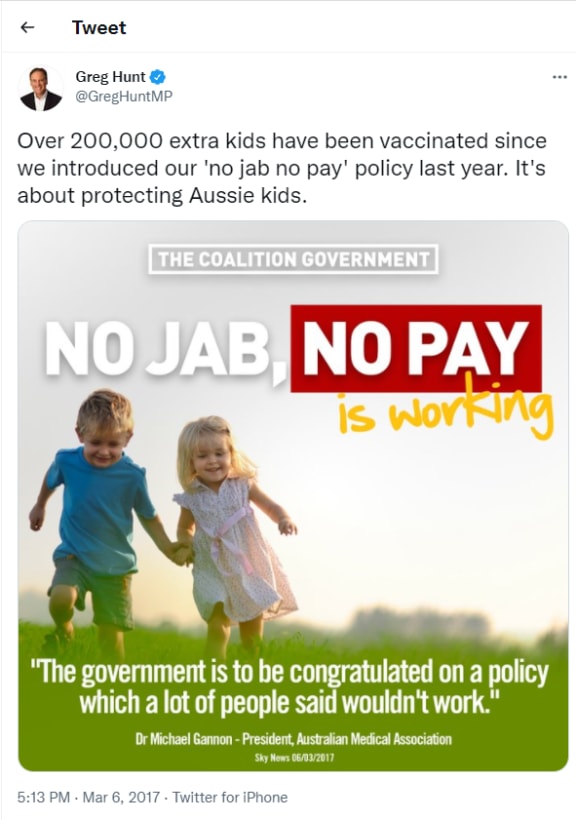
Photo: Twitter
This trend was likely to have continued except for the fact that the Australian government implemented a no jab no pay policy. This policy, rather more forceful than what our government is willing to do, essentially ties family welfare benefits to getting immunised. And once they did that they were able to reverse that trend in rising vaccine hesitancy.
Closer to home, a recent study here earlier this year surveyed 1,400 people about Covid-19. 24% said that they were unlikely to have the vaccine if offered to them and of that group, 16% said that they would flat-out refuse.
So there are stats from New Zealand, from Australia. I’m doing some work with a colleague in Normandy, and he paints a similar picture of vaccine hesitancy growing in France and in other parts of Europe. Conspiracy theories and misinformation are also driving the anti-vax movement in North America. So it is on the increase. So why?
I did some work on the anti-vax movement more than 10 years ago and in 2011 and I’m currently doing some work looking at covid-19 anti-vaccination.

Photo: AFP
Mike Lee:
There are four reasons for vaccine hesitancy:
The first one is ideological opposition. This is a philosophical resistance to the idea of vaccinations. You may think that vaccines are unnatural, artificial, man-made. There is a real trust and belief in nature as a reason to be against vaccines. If you had everything that your body needed in nature, such as good nutrition, and you were not living a stressful life, then you should be able to fight off the disease without vaccination.
I’ll call that the left-hand extreme – the people who believe in nature and are very mistrustful of big Pharma. On the extreme right, we have people who have faith in God. Their reasons are similar, except that rather than nature, it’s God who created the human being in a perfect mould. And the creation of God has everything it needs to fight the disease.
Anti-vaccination is one of those things where the extreme left and extreme right actually agree on the same thing: that Big Pharma or Big Brother are not to be trusted. And that is the reason why they reject vaccinations for Covid-19.
People operating at that very abstract level, attracted to some of the stuff we see in conspiracy theories are very difficult to change. In fact, I would say that it was nearly impossible to change the way they act. And so if any plan of herd immunity relies on these people changing their mind, that’s probably not going to happen.
So one level down from that position is the issue of freedom of choice (although none of these reasons are mutually exclusive).
Position two – freedom of choice – is a reason that is probably a little bit more tangible for some of us. We may know people in our family circles that actually have this as a reason. If you are told what to do, or in the case of the Australian, no jab no pay policy issue simply forced to do what the establishment wants you to do, then you will push back against it even more. In psychology or marketing there is this theory called reactance theory.
It is the theory that when you take choices away from people, or when you tell them what to do, they will react against that hegemony, power or domination. They’ll want to do everything to resist what they’re being told to do. You know, if you take a bunch of choices away from someone, they will like the only choice that you’ve given them less than if they had these other choices to refuse by themselves.
This is so even if those choices that they’ve been given, were never even in the top of their consideration set. The mere fact of taking away those choices, makes the final remaining alternative less attractive than having those choices there. Even if they would never have been interested in them the first place.
So this could be why our government is reluctant to introduce a no jab, no pay policy, because when you start forcing people to do something, that takes away the value of the thing that you want them to do.
And so, with reactance theory and freedom of choice, people ask, “If we accept this direction without any question, then what’s the next thing that’s going to give?” They see it as a wedge – a bigger domineering force, that is coming at them.
Now, when we talk about freedom, the counterbalance is freedom from harm. Yes, people have a right to choose not to do a medical procedure, but other people also have a right not to be harmed by that action.
I mentioned before that people who are immuno-compromised, or not in the right age bracket, or whatever it might be. So do we weigh up their freedom from harm as being more significant or the decreased freedom of choice that may needed to get people to comply?
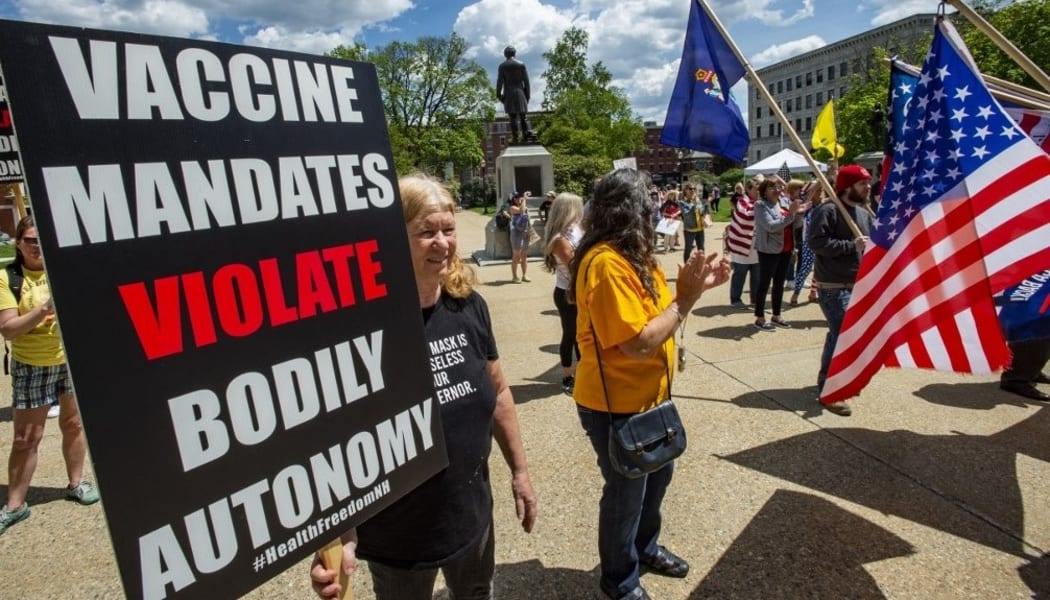
Photo: AFP
Mike Lee:
So now on to the third reason. This is a risk-to-benefit ratio.
The way the risk-to-benefit ratio works is that you have the risk of the disease, which, as you know, is high because if you catch a disease, it’s going to give you a whole bunch of grief and may even kill you. Or you might spend a lot of time in hospital.
And then you’ve got the risk of the vaccine. Every medical procedure has some risk, but it’s low.
As more people get vaccinated and as fewer people have a disease-causing stress to the health system, the risk of catching the disease actually goes down. And immunisation becomes a victim of its own success because the risk of the vaccine never really changes – it’s always its always going to be at the rock bottom.
The risk of the vaccine is low, but the risk of the disease is variable, moving up and down depending on how many people are actually immunised. This is one of the paradoxes of vaccination – that a highly successful vaccination campaign becomes a victim of its own success.
And the other paradox related to this risk-to-benefit ratio, is that the people that are thinking, “There’s a risk of the vaccine and there’s a risk of disease. I’m going to weigh it up and not take the vaccine.” But that sort of thinking only works if no one else is thinking the same thing.
So they actually don’t want everyone to be privy to their ideas because if that were the case, and no one will get vaccinated, they would not be able to remain out of the vaccination circuit. They need everyone else to get vaccinated so that they can sit back and not have any sort of risk at all. So that was the risk-to-benefit ratio.
The final reason is uncertainty, and this is the biggest reason that all of us can identify with.
Because we hear the stories about how these vaccines have pushed through at speeds that are unheard of, with technology that’s never been used in humans, etc., etc., it makes people uncertain about which brand of vaccine they should take.
So one of the new findings I’m discovering with my colleague in France looking at the anti-vax movement is that in the past branding and country of origin, which were once never taken into account for anti-vax reasons, now does start to make a difference. This new thing is a little bit concerning because vaccines should be treated instead like a commodity. They should be all the same, so you don’t have people wanting a certain brand versus another brand.
So those are the four reasons: ideological beliefs, the issue of freedom of choice, an assessment of the risk-to-benefit ratio and uncertainty.
But where does that uncertainty come from? It’s been around ever since vaccines have been around. The earliest case of vaccine hesitancy was in the 1800s when the smallpox vaccine was invented. Part of that process involves taking something from cowpox. There was already a lot of propaganda asking “How can you take something from a cow to cure something in humans?”
Mike Lee:
More recently, Andrew Wakefield in his 1998 study linked the MMR (measles mumps and rubella) vaccine to autism. It’s since been disproven, but it’s enough to sow the seeds of doubt, which then leads to more uncertainty.
The problem is that when people don’t feel that they’re able to voice their concerns or ask questions, because they think they’ll be judged by mainstream media or other people in their circles, they will go underground down the rabbit hole of misinformation.
Uncertainty is the main reason and it’s also the one that we probably have the most ability to control. Because we can’t change the ideology of someone if they really think that God made humans perfect and that vaccines are unnatural. Whereas with uncertainty, we’re going to have a better shot.
Now some numbers related to risks:
- 0.037% is the chance of getting a side effect from a covid vaccine
- 0.0046% is the chance of getting a severe side effect
- 2% is the fatality rate on average from those getting Covid-19
I’m using them to illustrate that people can’t really comprehend numbers beyond what they see as the human experience. So, when we talk about a nanosecond or millions of years or billions of dollars, people don’t compute.
Mike Lee:
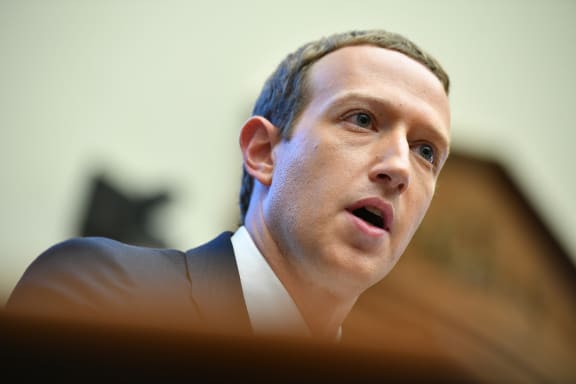
Facebook CEO Mark Zuckerberg Photo: AFP
The Zuckerbergs, for example, donated $250 million to charity. We understand 250,000,000 is a massive number, but we don’t really understand is that it was only 0.238% of their wealth.
And on the rest of it, they don’t pay tax. And similarly, Jeff Bezos donated $10 billion to defining climate change. That’s massive, right? He's got two hundred billion dollars in wealth and on average, pays 0.98% tax.
10 billion sounds like a lot. He sounds pretty generous, but theoretically, everyone listening to this is more generous than Jeff Bezos because we pay more tax than he is.
So these numbers work against us. When I say you’ve only got a 0.0372 chance of having side effects from Covid, that does not compute. We understand two percent as being low because our human experience operates within that realm where 100 is a significant number.
Two percent is such a low number, right? But it is actually massively higher than 0.00476% (which is the chance of getting a severe reaction to the Covid vaccine).
To put it in another perspective, 0.0372 is a 1 in 3,000 chance. 0.00476 is a 1 in 25,000 chance. So there’s a 1 in 25,000 chance of getting a severe a side effect from the vaccination. However, there is a one in 50 chance of dying from Covid, based on the data that we have. That’s the other problem of science, that data is always changing, which increases uncertainty.
I guess the point of showing all this is that people think in stories, they don’t think in statistics.
Another great statistic: one in 3,838,000. That is the chance of winning Lotto. Yet people still buy lottery tickets. So this goes to show that people don’t really understand statistics. They believe in stories.
We’ve been raised to be the centre of our universe, and so we look for information that supports our narrative and confirms our pre-existing biases. The problem with science is that it works on the bell curve. It focuses on the boring stuff which happens in the middle. The averages. What happens to most people most of the time. Stories, on the other hand, are bimodal. So that means that we focus on the extreme lows and the extreme highs. Our minds were designed to do that, to pay attention to things that are different.
That’s why misinformation is so sticky because it’s giving us information that is not the norm, that is beyond average. One in 8,338,000 is also about the same chance that you have of dying from a fatal shark attack.
We think of these numbers – despite their being very small – and they spook us. And so, of course, it makes sense that people will believe in side-effects, even though statistically, speaking, they are very low.
Mike Lee:
So, what three things are there to do, to combat vaccine misinformation?
The first thing is this concept of apophenia – the phenomenon that people have when they see patterns where patterns do not exist. They make links between bits of information that are not causally linked. Apophenia is what it means to be human, because when we evolved, it was safer to make random connections between disparate pieces of information than not to do that. You hear a funny sound? A lion jumps out and kills your neighbour. Next time, when you hear that funny sound, you are better to predict that that might happen again, even though the two things might not be related. Evolutionarily, we’re designed to look for patterns between things that may not actually be true.
The second thing is the availability heuristic.
This is the idea that the more you are exposed to information, the more you think it’s true.
Misinformation works that way because the algorithms feed you the same information you’ve been looking at. It’s like a reward system. The more you see the information that confirms that bias, the more you think it’s true.
And the final head wiring that makes us susceptible to misinformation is confirmation bias. So this is the fact that people look for information that confirms their pre-existing biases.
And you see how this also affects misinformation and vaccine hesitancy.
So, in conclusion, people think in stories, not in stats. Storytelling could be used to reverse vaccine hesitancy. Unfortunately, those stories may not be very exciting, nor very memorable because they’re based on averages and bell curves. But hopefully an awareness of our cognitive biases – apophenia, the availability heuristic and confirmation bias – can help us develop herd immunity against misinformation.
About the speaker
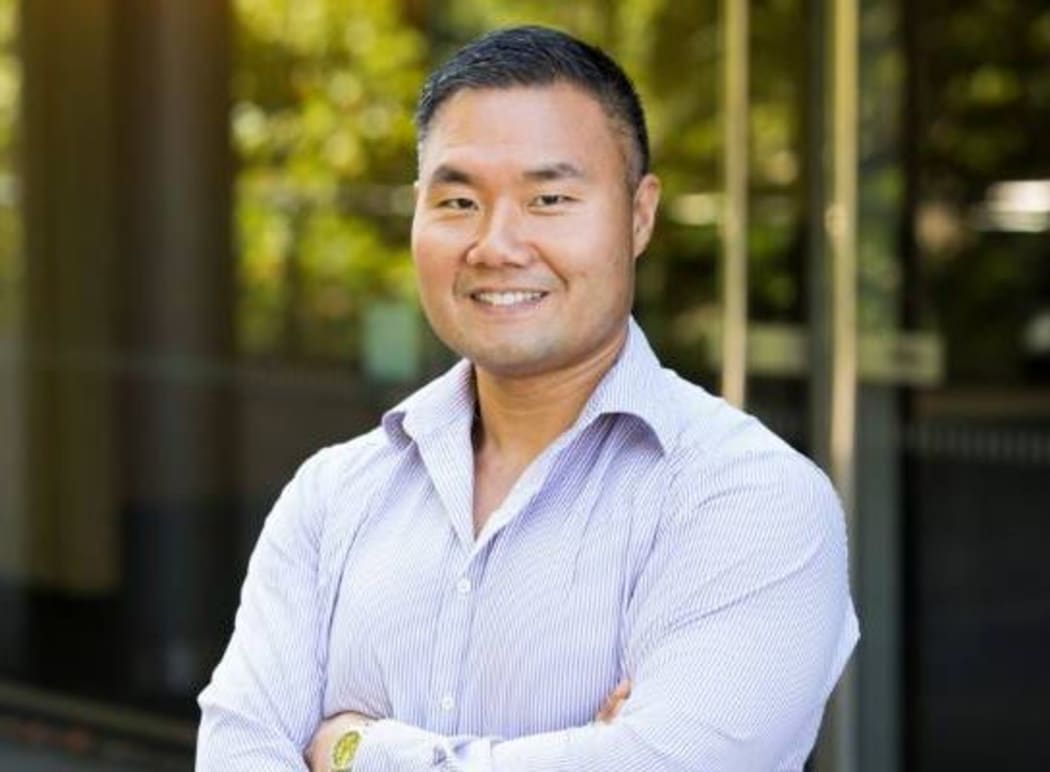
Dr Mike Lee Photo: Supplied
Assoc. Prof. Mike Lee
Dr Michael Lee is an Associate Professor of Marketing at the University of Auckland. With a background in marketing and industrial and organisational psychology, he has specific expertise in brand avoidance, consumer resistance, activism, and anti-consumption. Within the Business School, he is the Director of The International Centre of Anti-Consumption Research, supervising PhD students working on projects such as religiously motivated boycotting and anti-consumption in emerging economies.
This audio is from Auckland University’s Raising the Bar Home Edition
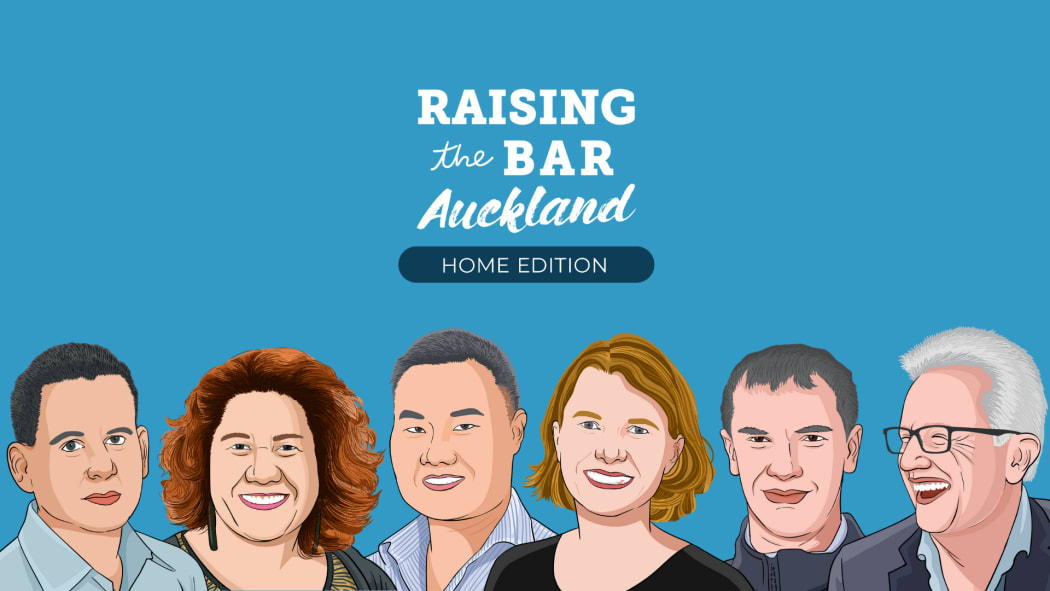
Photo: University of Auckland

